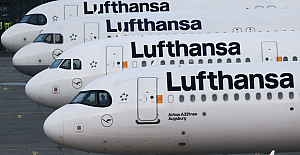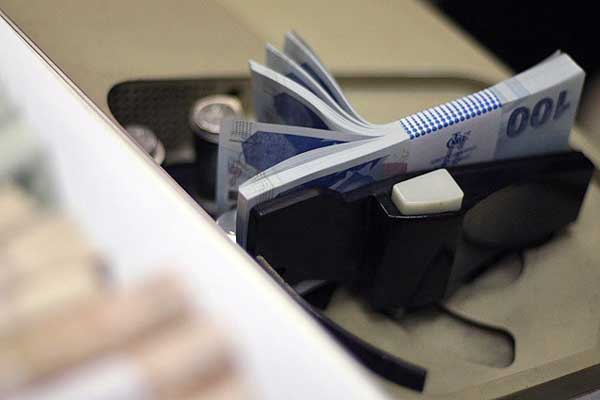The Turkish Central Bank has disclosed that the private sector has seen its long-term foreign debt increase to $166.5 billion since December. The sector's short-term foreign debt, - the debt that must be paid in the next 12 months - also increased by $3.3 billion to $43.7 billion over the same period. Data released by the bank indicated that more than half of Turkey's private sector long-term debt was in dollars, at 58 percent, with 34 percent in euros and 6 percent in Turkish lira. For short-term debt, 48 percent was in dollars, with 40 percent in euros and 11.2 percent in Turkish lira. Almost 60 percent of foreign credit comes from EU countries such as Germany and the U.K., the central bank reported. The finance sector, especially banks, has a 37.1 percent share in long-term private sector debts, worth $61.8 billion. Analysts argue that Turkey's private sector debt is not at alarming levels. "When we look at the structure of companies we see that companies with Forex loans are usually well established firms usually at conglomerate scale. Those firms can afford employing professional staff capable of managing Forex risk," Tamer Yilmaz, a senior economist from Ziraat Investment, said.
“According to Turkey's Central Bank research in February of this year 63 percent of all companies in Turkey do not have a foreign debt at all. And of the remaining 37 percent, a majority of the companies are exporters which means, these companies are naturally hedged against currency shocks.”
"Therefore the bank monetary policy committee adopted a “fire-wall” approach back in 2012. They came up with an innovation called Reserve Option Mechanism (ROM)," Yilmaz said. "According to ROM scheme, commercial banks were offered to keep their reserve requirements in foreign currency. Quickly all banks in Turkey switched their reserve strategies and they prefer keeping dollars in the vaults of the central bank rather than Turkish lira. These dollars in the central bank vaults act as a buffer against a “sudden-stop” scenario."
Turkish businesses and the public have increasingly used dollar accounts since May last year when the country was rocked by violent anti-government protests.
Companies and ordinary citizens have put $25.8 billion of their cash into U.S. dollars over the year up to May – the highest-ever annual amount – as they look to protect their savings from depreciation in the Turkish lira, according to official figures.
Turkish dollar accounts grew from $56.8 billion to $82.6 billion in the year up to May, an increase of 45 percent.
Earlier this year, Turkish lira lost more than 25 percent of its value against dollar. In January 28, the central bank introduced drastic interest rate rises in response to the dollar’s rise against the lira.



 The candidates vying to be the next London mayor
The candidates vying to be the next London mayor Enfield Council commits to anti-racism and diversity pledge
Enfield Council commits to anti-racism and diversity pledge President Erdogan promised supporters his party would learn its lessons from the defeat
President Erdogan promised supporters his party would learn its lessons from the defeat Mayor of London and London Assembly elections
Mayor of London and London Assembly elections Future Painters Exhibition at Tottenham Hotspur Stadium
Future Painters Exhibition at Tottenham Hotspur Stadium Models of Teaching International Journalism for Sustainable Development
Models of Teaching International Journalism for Sustainable Development UK and US scientists have been working on eclipse observations
UK and US scientists have been working on eclipse observations Unsupportive goverment policies jeopardizing foundation of UK food security
Unsupportive goverment policies jeopardizing foundation of UK food security English Premier League leaders Arsenal will visit title contenders
English Premier League leaders Arsenal will visit title contenders Liverpool meet Atalanta and West Ham face Bayer Leverkusen
Liverpool meet Atalanta and West Ham face Bayer Leverkusen Arsenal face Bayern Munich and Manchester City play Real Madrid
Arsenal face Bayern Munich and Manchester City play Real Madrid UK Transfer deadline day, the transfer window closes tonight
UK Transfer deadline day, the transfer window closes tonight Europe's travel strikes: Flight and train disruption you can expect in April
Europe's travel strikes: Flight and train disruption you can expect in April Enfield Council website achieves digital inclusion recognition
Enfield Council website achieves digital inclusion recognition Enfield Council’s Planning Enforcement team goes from strength to strength
Enfield Council’s Planning Enforcement team goes from strength to strength UK's first Turkish Shacklewell Lane Mosque faces threat to its future
UK's first Turkish Shacklewell Lane Mosque faces threat to its future













